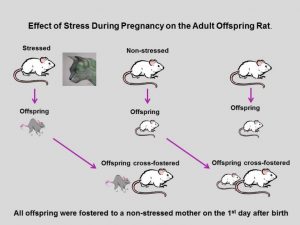It can be hard to establish the effects of prenatal stress on the fetus and the child in humans, because so many problems can occur together. If the mother is stressed, anxious or depressed while she is pregnant she is likely to be the same after the baby is born. Many studies have tried to take account of this, but it is difficult.
But the evidence from animals is quite clear. Prenatal stress has a long term effect on the offspring. It is possible to foster the newborn rat of a stressed mother to a new mother, on the first day after birth and compare their behaviour as they grow up with that of a newborn rat whose mother was not stressed in pregnancy. One method used is shown in the diagram. The pregnant rat is stressed by exposing her to the smell of a cat.

Animal experiments have shown that prenatal stress can cause all the following effects on the offspring:
- More anxiety
- Reduced attention
- Learning deficits
- Less difference in function between the left and right sides of the brain
- Effects different on male and female offspring
- Altered sexual behaviour – males show homosexual behaviour and females are less nurturing mothers.
Importantly, all these effects have also been demonstrated in humans, except for the alterations in sexual behaviour.